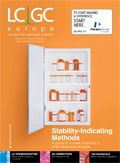Analytica 2014
A look at some highlights for chromatographers at Analytica 2014.
Analytica returns to Munich this year, with a focus on the latest analytical techniques and innovative applications. The conference will take place from 1–3 April at the Internationales Congress Center München, and the trade fair will be held from 1–4 April at the Munich Trade Fair Center in Germany.
The Analytica conference is held biannually in the beautiful city of Munich bringing together internationally renowned experts around the world to present more than 120 lectures in the constantly evolving field of analytical chemistry.
The scientific programme has been organized by the German Chemical Society (GDCh), the Society for Biochemistry and Molecular Biology (GBM), and the German United Society for Clinical Chemistry and Laboratory Medicine (DGKL). The conference will cover all areas of analytical chemistry, with a focus on food analysis, water analysis, polymer analysis, environmental analysis, and pharmaceutical analysis.

The first day features a full-day symposium on Aerosols and Health. Fourteen speakers from Germany, Finland, Great Britain, Norway, Australia, Canada, the USA, and Switzerland will take an in-depth look at the characterization and effects of aerosols. In this session, Per Schwarze from the Norwegian Institute of Public Health in Oslo, Norway, will reveal how to handle the cocktail of contaminants that is produced when diesel fuel is burned. Robert Healy from the University of Toronto (Toronto, Canada) will describe single-particle mass spectrometry, a technique that can detect individual particles and identify pollution sources.
Testing for traces of pesticides, medications, and contaminants is no longer enough because analysts now need to identify decomposition products that can also be toxic. Confirmed speakers in this exciting area of research include Damia Barceló from the Institute of Environmental Assessment and Water Research in Barcelona, Spain. Barcelo will talk about a method that combines turbulent-flow LC with an Orbitrap MS system to identify transformed pharmaceuticals in wastewater, and Juliane Hollender from the Federal Institute of Aquatic Science and Technology (Eawag) in Dübendorf, Switzerland, will describe an LC–MS–MS-based technique for analyzing water and sediment samples.
Bioanalysts are also venturing into areas that appeared unreachable just a few years ago. The Limits and Scales in Analytical Sciences symposium will feature Kannan Balasubramanian from the Max Planck Institute for Solid State Research in Stuttgart, Germany, presenting a lecture on sensors that can detect attomolar quantities of nucleic acids, and Andrew deMello from ETH in Zurich discussing microfluidic systems for high-throughput experiments with DNA, living cells, and multiple-cell organisms.
All three days of the conference will include innovative developments in separation science, but two half-day symposia on the third day will focus on Hyphenated Techniques in Modern Analytical Chemistry and Modern Trends in Separation Sciences: Exploring the Limits. Confirmed speakers in these sessions include Karl-Siegfried Boos from the University of Munich (Munich, Germany) presenting a lecture on an LC–MS–MS analyzer for the fully automated analysis of blood and other body fluids, and Wolfgang Goetzinger from Amgen (Massachusetts, USA) discussing the challenges facing analysts in pharmaceuticals research.
The complete programme and abstracts of the conference are available online at www.analytica.de/en/conference and at www.gdch.de/analyticaconf2014
Technology Trends
Alongside the scientific programme, more than 1100 exhibitors are expected to present the latest products and developments in the field. In the Live Labs, presentations are planned three times a day — 11:00, 13:00, and 15:00 — and will cover routine analysis applications, as well as specialist analysis techniques. In the Analytica forums application-based exhibitor lectures will give routine-analysis professionals tips that are relevant to business and actual applications.
All visitors attending Analytica may participate in the conference free of charge. For the first time ever, the conference is being held at the ICM — Internationales Congress Center München, directly next to the exhibition halls.
Contact: Messe München, info@analytica.de

AOAC International Awarded NIST Grant for Developing Drug Testing Standards
October 31st 2024The grant will be part of a new collaborative scientific initiative to address the need for standards that define the desired performance of lateral flow immunoassay test strips to detect illicit drugs in tablets and powders.
AI and GenAI Applications to Help Optimize Purification and Yield of Antibodies From Plasma
October 31st 2024Deriving antibodies from plasma products involves several steps, typically starting from the collection of plasma and ending with the purification of the desired antibodies. These are: plasma collection; plasma pooling; fractionation; antibody purification; concentration and formulation; quality control; and packaging and storage. This process results in a purified antibody product that can be used for therapeutic purposes, diagnostic tests, or research. Each step is critical to ensure the safety, efficacy, and quality of the final product. Applications of AI/GenAI in many of these steps can significantly help in the optimization of purification and yield of the desired antibodies. Some specific use-cases are: selecting and optimizing plasma units for optimized plasma pooling; GenAI solution for enterprise search on internal knowledge portal; analysing and optimizing production batch profitability, inventory, yields; monitoring production batch key performance indicators for outlier identification; monitoring production equipment to predict maintenance events; and reducing quality control laboratory testing turnaround time.